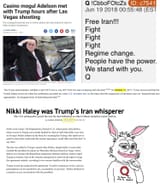Anonymous
ID: 0zdfdUa1
6/23/2025, 6:40:05 PM No.508473093
>Ironically, the attack came after Trump's special envoy, Steve Witkoff, and Iranian Foriegn Minister Abbas Araghchi agreed that the first three rounds of nuclear talks in Oman and Italy could be a credible base for an agreement.
>An informed Iranian source told me: "The key elements of the deal between Witkoff and Araghchi were agreed upon over three rounds of negotiations in Muscat and Rome. The deal was as follows: Iran would accept maximum nuclear inspections and transparency, including implementation of the Additional Protocol and Subsidiary Arrangements Code 3.1 - the highest international mechanisms for inspecting a country's nuclear programme."
>The source added: "Second, Iran would convert or export its existing stockpile of 60-percent enriched uranium, which is sufficient to build 10 nuclear bombs. Third, Iran would halt its current high-level enrichment at 60 percent and 20 percent and reduce it to the level of civil purposes, which is 3.67 percent. Finally, Iran would fully cooperate with the IAEA to resolve all technical ambiguities.
>"In return, the United States would lift the nuclear-related sanctions. It was agreed that the technical teams of both sides would draft the final agreement based on these four points. But suddenly, after a call between Netanyahu and Trump, the American side stopped sending its technical team to Muscat and, in a 180-degree shift in its position, demanded the complete shutdown of Iran's peaceful enrichment programme.
>"This shift delayed the agreement until Trump's two-month deadline expired - and while the sixth round was set for day 63, Israel launched an attack on Iran on day 61. This was Israel's trap - designed to drag the US and Trump into a war with Iran."
https://www.middleeasteye.net/opinion/after-us-attack-iran-could-reconsider-its-nuclear-strategy
>An informed Iranian source told me: "The key elements of the deal between Witkoff and Araghchi were agreed upon over three rounds of negotiations in Muscat and Rome. The deal was as follows: Iran would accept maximum nuclear inspections and transparency, including implementation of the Additional Protocol and Subsidiary Arrangements Code 3.1 - the highest international mechanisms for inspecting a country's nuclear programme."
>The source added: "Second, Iran would convert or export its existing stockpile of 60-percent enriched uranium, which is sufficient to build 10 nuclear bombs. Third, Iran would halt its current high-level enrichment at 60 percent and 20 percent and reduce it to the level of civil purposes, which is 3.67 percent. Finally, Iran would fully cooperate with the IAEA to resolve all technical ambiguities.
>"In return, the United States would lift the nuclear-related sanctions. It was agreed that the technical teams of both sides would draft the final agreement based on these four points. But suddenly, after a call between Netanyahu and Trump, the American side stopped sending its technical team to Muscat and, in a 180-degree shift in its position, demanded the complete shutdown of Iran's peaceful enrichment programme.
>"This shift delayed the agreement until Trump's two-month deadline expired - and while the sixth round was set for day 63, Israel launched an attack on Iran on day 61. This was Israel's trap - designed to drag the US and Trump into a war with Iran."
https://www.middleeasteye.net/opinion/after-us-attack-iran-could-reconsider-its-nuclear-strategy
Replies:




